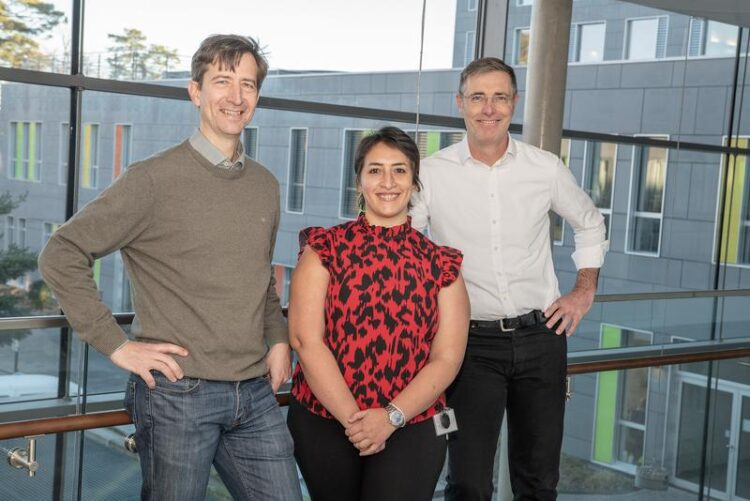Tracking down leaks in the blood-brain barrier

New insights in epilsepsy research & optimization of drug action: (from left) Prof. Dirk Dietrich, Dr. Amira Hanafy and Prof. Alf Lamprecht use a new analytical method to get to the bottom of leaks in the blood-brain barrier:
Rolf Müller
(c) University Hospital Bonn
In epilepsy research, it has long been assumed that a leaky blood-brain barrier is a cause of inflammation in the brain.
Using a novel method, researchers from Bonn University Hospital (UKB) and the University of Bonn have demonstrated that the barrier between the blood and the central nervous system remains largely intact. The approach of their study provides important insights into the development of epilepsy and could significantly optimize drug development in the pharmaceutical industry. The study results have recently been published in the renowned journal “Nature Communications”.
500 kilometers of vessels in the human brain are lined with ten square meters of thin cell layer – the blood-brain barrier (BBB). This barrier protects the brain against harmful substances as well as pathogens. It also links the brain to the other organs in the body. If this selective barrier is leaky, diseases such as Parkinson’s, multiple sclerosis, Alzheimer’s could develop. Malfunctions of the BBB also play an important role in brain tumors. Researchers at the UKB and the University of Bonn want to get to the bottom of these interactions. To study BBB transport at the cellular level, they developed micropipette-based local perfusion of capillaries, i.e. finest blood vessels, in acute brain slices and combined it with multiphoton microscopy.
Prof. Dirk Dietrich, head of the experimental neurosurgery section at the Clinic of Neurosurgery at the UKB, compares the new analysis technique of the blood-brain barrier investigated in the study to a flat bicycle tire: “If the tire loses air, you don’t know where the leak is. That’s why you hold the inflated bicycle tube under water to identify the leak. This principle also underlies our method.” The researchers use a micropipette to fill the microscopic blood vessels with a liquid from the inside. Leaks are then visible to them under the multiphoton microscope.
His colleague Alf Lamprecht, Professor of Pharmaceutical Technology and Biopharmacy at the Pharmaceutical Institute of the University of Bonn, hopes that the new method could advance early drug development: “When a new active ingredient is developed, the question always arises as to whether and, above all, how it passes the blood-brain barrier. Identifying these transport mechanisms and barriers is enormously important for making the drug available in the brain.” The results of the current study have potential to solve this problem in pharmacy. First author of the published article Dr. Amira Hanafy, a postdoctoral fellow at UKB’s Clinic of Neurosurgery, sums up: “With the method we developed, we have a good tool to evaluate whether active ingredients reach the brain.”
Publication: Amira Sayed Hanafy et. al.: Subcellular analysis of blood-brain barrier function by micro-impalement of vessels in acute brain slices; Nature Communications; https://doi.org/10.1038/s41467-023-36070-6
Participating institutions: Clinic of Neurosurgery, University Hospital Bonn; Institute of Pharmacy,University of Bonn; Section for Translational Epilepsy Research, Clinic of Neuropathology and Clinic of Epileptology, University Hospital Bonn; Synapse Proteomics, Children’s Medical Research Institute, The University of Sydney, Australia.
Funding: BONFOR, DFG INST1172 15, Alexander von Humboldt Foundation
Press contact:
Daria Siverina
Deputy Press Officer at the University Hospital Bonn (UKB)
Communications and Media Office at Bonn University Hospital
Phone: +49 228 287-14416
E-mail: daria.siverina@ukbonn.de
About the University Hospital Bonn: The UKB cares for about 500,000 patients per year, employs 8,800 people and has a balance sheet total of 1.5 billion euros. In addition to the more than 3,300 medical and dental students, a further 580 people are trained each year in numerous healthcare professions. The UKB is ranked first among university hospitals in NRW in the science ranking and in the Focus clinic list and has the third highest case mix index in Germany.
Wissenschaftliche Ansprechpartner:
Prof. Dirk Dietrich
Head of the experimental neurosurgery section
Clinic for Neurosurgery
Bonn University Hospital
Phone: +49 228 287 19224
E-mail: dirk.dietrich@uni-bonn.de
Prof. Alf Lamprecht
Chair of Pharmaceutical Technology and Biopharmacy
Pharmaceutical Institute
Bonn University
Phone: +49 228 73 5243
E-mail: alf.lamprecht@uni-bonn.de
Originalpublikation:
Amira Sayed Hanafy et. al.: Subcellular analysis of blood-brain barrier function by micro-impalement of vessels in acute brain slices; Nature Communications; https://doi.org/10.1038/s41467-023-36070-6
Media Contact
All latest news from the category: Health and Medicine
This subject area encompasses research and studies in the field of human medicine.
Among the wide-ranging list of topics covered here are anesthesiology, anatomy, surgery, human genetics, hygiene and environmental medicine, internal medicine, neurology, pharmacology, physiology, urology and dental medicine.
Newest articles

First-of-its-kind study uses remote sensing to monitor plastic debris in rivers and lakes
Remote sensing creates a cost-effective solution to monitoring plastic pollution. A first-of-its-kind study from researchers at the University of Minnesota Twin Cities shows how remote sensing can help monitor and…

Laser-based artificial neuron mimics nerve cell functions at lightning speed
With a processing speed a billion times faster than nature, chip-based laser neuron could help advance AI tasks such as pattern recognition and sequence prediction. Researchers have developed a laser-based…

Optimising the processing of plastic waste
Just one look in the yellow bin reveals a colourful jumble of different types of plastic. However, the purer and more uniform plastic waste is, the easier it is to…



